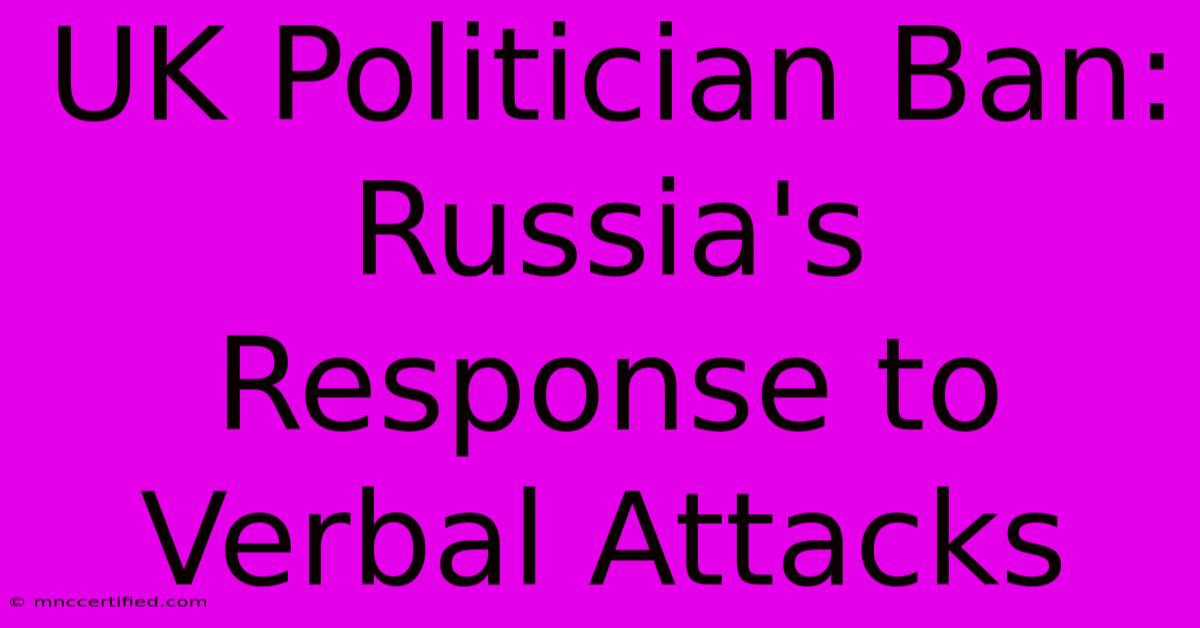UK Politician Ban: Russia's Response To Verbal Attacks

Table of Contents
UK Politician Ban: Russia's Response to Verbal Attacks
The recent ban imposed by the UK government on several Russian politicians has ignited a fresh wave of tension in the already strained relationship between the two nations. This article delves into the specifics of the ban, Russia's retaliatory measures, and the broader geopolitical implications of this escalating conflict. We'll examine the key players, the arguments used to justify the actions, and potential future consequences.
Understanding the UK's Sanctions
The UK's decision to ban a number of Russian politicians stems from their alleged involvement in human rights abuses and the ongoing conflict in Ukraine. These sanctions, impacting individuals deemed key figures in the Kremlin, typically involve asset freezes, travel bans, and prohibitions on engaging in financial transactions within the UK. The stated aim is to hold accountable those responsible for undermining democratic processes and violating international law. The specific individuals targeted and the precise reasons for their inclusion on the sanctions list are meticulously documented in official government statements, readily available online. Keywords: UK sanctions, Russia sanctions, Russian politicians, human rights abuses, Ukraine conflict.
Key Figures Targeted & Rationale
While the exact list of banned individuals fluctuates, prominent figures consistently cited include those with close ties to Vladimir Putin and those directly involved in the annexation of Crimea or the ongoing war in eastern Ukraine. The UK government consistently emphasizes that these sanctions are a targeted response aimed at individuals, not a blanket condemnation of the entire Russian population. Keywords: Vladimir Putin, Crimea annexation, Eastern Ukraine conflict, targeted sanctions.
Russia's Countermeasures: Retaliation and Rhetoric
Russia's response to the UK's sanctions has been swift and decisive, mirroring the actions taken by the UK. Moscow has announced its own reciprocal sanctions targeting a number of UK politicians, employing similar measures of asset freezes and travel bans. The rhetoric accompanying these actions has been notably aggressive, characterizing the UK's actions as unwarranted provocation and a violation of international norms. Keywords: reciprocal sanctions, Russian retaliation, geopolitical tension, UK-Russia relations.
Analyzing the Retaliatory Actions
Russia's counter-sanctions are not merely symbolic gestures. They represent a calculated response designed to escalate the conflict and demonstrate Moscow's willingness to retaliate against perceived injustices. The specific individuals targeted by Russia often reflect those who have been particularly vocal in criticizing the Kremlin's policies, highlighting the clear connection between verbal criticism and punitive action. Keywords: escalation of conflict, diplomatic tensions, verbal attacks, punitive measures.
The Broader Geopolitical Landscape
The escalating exchange of sanctions between the UK and Russia underscores the deep-seated tensions shaping the current global geopolitical landscape. This tit-for-tat exchange is not an isolated incident but rather a symptom of the broader geopolitical rivalry between the West and Russia. Understanding this context is crucial for interpreting the actions of both countries and predicting future developments. Keywords: geopolitical rivalry, West-Russia relations, international relations, global politics.
Potential Future Implications
The ongoing exchange of sanctions carries significant implications for international relations, potentially escalating tensions further and undermining diplomatic efforts to resolve existing conflicts. The impact on trade and economic relations between the UK and Russia is also a major concern. Furthermore, the precedent set by these reciprocal actions could encourage similar actions by other nations, further fragmenting the international community. Keywords: international consequences, economic impact, diplomatic efforts, global fragmentation.
Conclusion: A Cycle of Escalation?
The UK's sanctions on Russian politicians and Russia's subsequent retaliation represent a significant escalation in the already strained relationship between the two countries. Whether this marks the beginning of a dangerous cycle of escalation or a temporary surge in tension remains to be seen. The international community must engage actively in diplomatic efforts to de-escalate the situation and prevent further deterioration of the already fragile global peace. The long-term consequences of this ongoing conflict remain uncertain, demanding close observation and analysis from political scientists and global observers alike. Keywords: escalation cycle, diplomatic solutions, global peace, international relations analysis.

Thank you for visiting our website wich cover about UK Politician Ban: Russia's Response To Verbal Attacks. We hope the information provided has been useful to you. Feel free to contact us if you have any questions or need further assistance. See you next time and dont miss to bookmark.
Featured Posts
-
Arsenals Rice Early Champions League News
Nov 27, 2024
-
Subaru Forester Insurance Cost
Nov 27, 2024
-
D And O Insurance Not For Profit
Nov 27, 2024
-
Confirmed Lineups Bayern Vs Psg Match
Nov 27, 2024
-
Fwd Voluntary Health Insurance
Nov 27, 2024